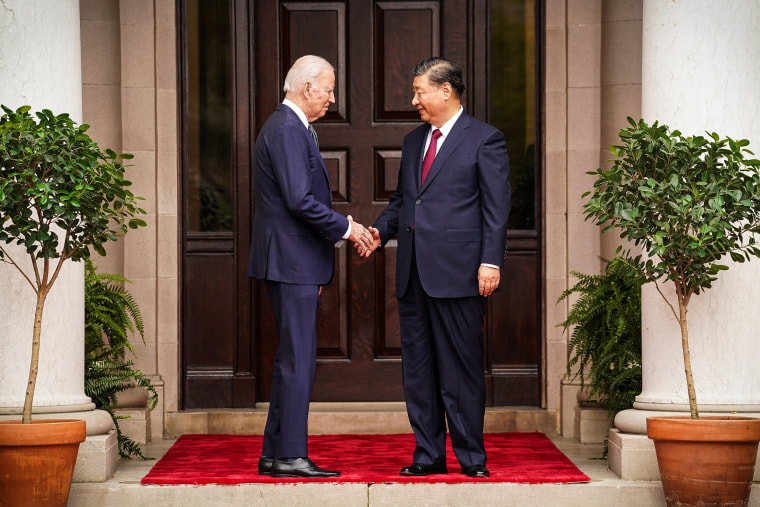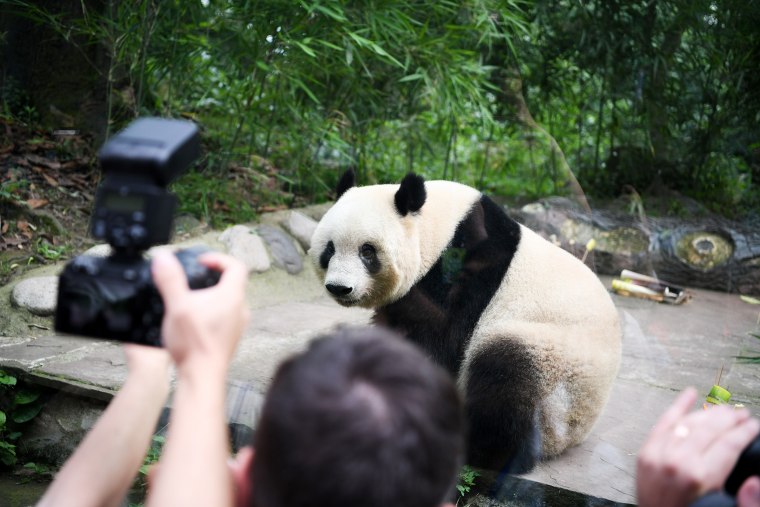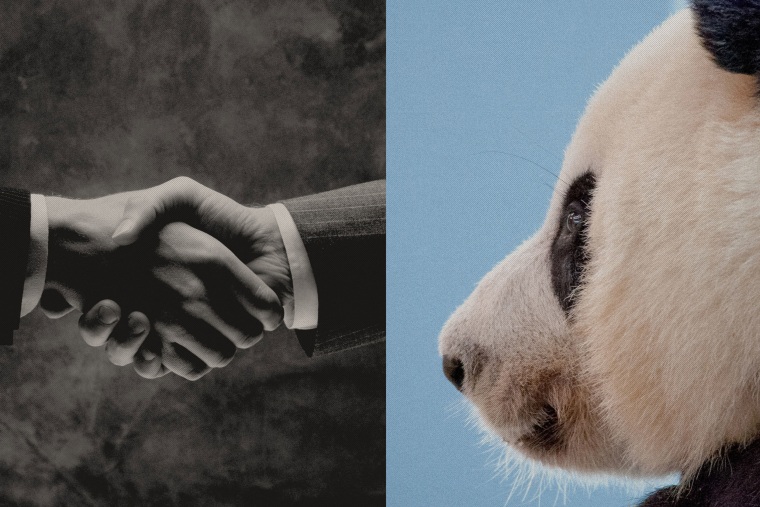HONG KONG — A pair of giant pandas will soon be on their way to the U.S. from China, as Beijing resumes the “panda diplomacy” that has sent the beloved bears around the world for decades to boost foreign relations and project Chinese soft power.
But not everyone is happy about it.
A particularly passionate online community of panda fans in China and elsewhere has embraced the black-and-white bears, which are native to China and seen as a national symbol, with a fervor usually reserved for pop singers and other celebrities — an enthusiasm that can verge on toxic.
They have reacted harshly to announcements that China will send a pair of pandas to the San Diego Zoo — they are expected to arrive in the city this week — and another pair to the National Zoo in Washington by the end of the year, going so far as to release personal information about their human caretakers online.
Some cite worries about the animals’ well-being, claiming without evidence that they are at risk of mistreatment.
Others’ opposition is more nationalistic as the U.S. and China, the world’s two largest economies, clash over a variety of issues, including trade, technology and Taiwan.
Some Chinese social media users have called for an end to panda diplomacy altogether, saying the program is a sign of “weakness” that will result in “a loss of dignity.”
“Aren’t our relations with the U.S. strained right now? Why are we so eager to send our national treasure into the lion’s den?” a commenter wrote on Weibo last month.

A flurry of panda deals
The online concern over the well-being of pandas at U.S. zoos can be traced to the sudden death of Le Le, a male panda that had been at the Memphis Zoo in Tennessee since 2003.
Le Le died of heart disease in February 2023 at age 24 — the equivalent of his 60s in human years — drawing an outcry from Chinese internet users who questioned the cause of death and worried about the health of his partner, Ya Ya.
Officials in China and the U.S. denied claims that Ya Ya was suffering from malnutrition and excessive confinement and said her hair appeared patchy because of a chronic skin and fur condition. Many of her fans were not convinced and demanded her return to China, which had already been scheduled for last year as the zoo’s 20-year loan agreement for the pandas reached its end.
In November, the National Zoo returned its three pandas to China as its loan agreement also expired, leaving Zoo Atlanta with the only four pandas in the U.S. and raising fears that a program that had symbolized U.S.-China amity since 1972 might be curtailed.
Those fears were eased in November when Chinese President Xi Jinping hinted during a visit to California that more pandas were on the way.
Since then, as the U.S. and China try to improve relations, Beijing has announced panda agreements with the National Zoo, the San Francisco Zoo and the San Diego Zoo, which has not had pandas since 2019.
The pair going to the San Diego Zoo, 4-year-old male Yun Chuan and 3-year-old female Xin Bao, are the first new pandas to arrive in the U.S. in decades.
China has also announced plans to send pandas to zoos in Spain, Austria and Australia.

Extreme fandom
As in the U.S. and other countries that host the bears, pandas are wildly popular in China, where visitors crowd exhibits at zoos and panda videos rack up views online.
Some fans go further, joining virtual communities dedicated to individual pandas. For instance, He Hua, a 3-year-old panda born at the Chengdu Panda Base in Sichuan province, has amassed a Weibo community of more than 870,000 followers.
Such enthusiasts “sign in” to the community daily, sharing photos and videos of the panda captured through a 24-hour livestreaming channel called iPanda that is run by state broadcaster CCTV.
Some larger communities organize offline events, mobilizing followers to participate in fundraising drives and online voting campaigns. The idea is to generate hype around individual pandas, just as fans of boy bands and girl groups promote some members over others.
Sometimes that extends to disparaging other pandas.
In January, extreme panda fans got into a dispute over a video that showed He Hua falling repeatedly to the ground while she was playing on a wooden structure with her sister, He Ye.
He Hua’s fans said He Ye was “bullying” the other bear and demanded the panda base improve its facilities.

Extreme panda fandom is not limited to China.
Fu Bao, South Korea’s first naturally bred panda, was born in 2020 to a pair of pandas in the city of Yongin. A single video of Fu Bao has over 26 million views on the Everland theme park’s YouTube channel, more than any other.
The 3-year-old bear left South Korea for China in April, in accordance with the rules for pandas born overseas. After her departure, allegations began to spread in the country that Fu Bao was being mistreated in her new home at a panda reserve in Sichuan province.
Though Chinese officials shared photos and videos showing Fu Bao in perfectly good health, Korean fans began a social media movement to “save Fu Bao” and “return Fu Bao,” even taking out an ad in Times Square in New York.
Some Fu Bao fans in China went to Sichuan to harass the panda experts and keepers, uploading their photos online to incite cyberbullying.
Gary Hsu, 24, a graduate student in Jiangsu province who loves pandas, told NBC News that he was sick of the “panda fandom.”
“I believe that toxic panda fans do not have the ability to think independently,” he said. “No matter which country’s zoo the pandas are sent to, they will say things that are beyond comprehension.”
Pandas’ cuddly nature triggers an instinctive human desire to nurture and protect them, said Chee Meng Tan, an expert in Chinese foreign policy and soft power at the University of Nottingham Malaysia.
That is heightened, he said, when the animals are viewed as an extension of the nation.
For some Chinese fans, a perceived slight against a panda “will be seen as an attack on the country and its people, as well,” Tan said. “So this becomes a very existential threat in some sense to the people who love or are big fans of pandas.”
But extreme fans’ efforts to keep pandas close to home are unlikely to affect China’s desire to build its international image, Tan said, “partly because the Chinese know that as far as soft power is concerned, nothing beats their furry ambassadors.”
